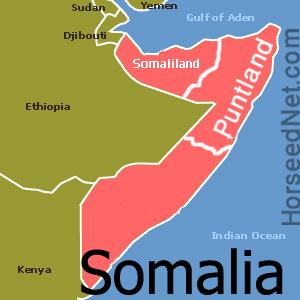Globalization cherry picks, and so do we on the failed-state carcass that is Somalia
 Tuesday, September 28, 2010 at 8:13AM
Tuesday, September 28, 2010 at 8:13AM 
Voice of America piece by way of reader Robert Prescott.
The opening (in more ways than one):
Somaliland’s Minister of Foreign Affairs said the willingness of residents living in the self-declared autonomous region to fully embrace democracy has played a pivotal role in making the area unattractive to hard-line Islamist insurgents, such as al-Shabab.
Mohammed Abdullahi Omar welcomed what he described as the renewed U.S. interest after a top official in the Obama administration said Washington wants to strengthen ties with both Somaliland and Puntland, located in the Horn of Africa.
The US official expressing interest is our top State diplo for Africa, Johnnie Carson. Interest, for now, equals more diplomats and aid officials. Our logic? Keep the al Shabaab problem as small as possible geographically.
These Somalis are more than happy to get direct US aid:
“Somaliland has been stable for the last 19 years and we have definitely adopted (a) system into our politics. And, we have had a free and fair presidential election a few weeks ago, whereby a new president won the election. This has demonstrated that Somaliland’s political system has matured.”
He added that Somaliland’s “matured” democracy has renewed interest not only from Washington, but also “other western countries, and made them change their view on Somaliland.”
And I would guess there is some eastern country interest as well.
Five points:
1) Note the pattern that where US troops go since the Cold War's end is to intervene mostly in fake states, and that one outcome of such interventions is that, where there was originally one state, now there are more than one state, meaning we effectively play mid-wife to the birthing of new countries--ones typically buried by past European colonial creations.
2) Globalization, which comes in many forms, has an interest in salvaging as much of Somalia as possible, making chunks open for business and access to East Africa, cutting down on the footprint of the pirates (not mentioned here so must not be a problem here), and keeping the al Shabaabh reach as small as possible. Somaliland really has been a break-away province going all the way back to our first intervention there at the junction of Bush-Clinton. It now presents just enough stability for the connectivity to happen.
3) This is my old story of the break-up of a fake or weak state when globalization shows up: the more stable and ambitious parts are more than eager to break off and make a better life for themselves with globalization, thus ending--in their minds (and often in objective reality)--their tragic relations with the other "losers."
4) Somaliland's emergence shows that we and other Core powers will be in the nation-building business for the very long haul. That doesn't--by any stretch--always result in troops or even aid, as most nation-building results from private-sector activity generating local public demand for government services--NOT THE OTHER WAY AROUND! But yes, if you, the state in question, can put on a good show of a modicum of democracy and stability, that is highly attractive, because it means whatever public nation-building efforts are made will proceed with little to no controversy back home.
5) Our goal for places like East Africa is to encourage overarching economic union in a radial pattern, meaning from the inside of Africa to the coasts like slices of pie. We want to help stitch together a pattern of economic complimentarity wherever possible, so that even places with modest resources are at least selling their location for transit of other peoples' goods. We want, in effect, to create larger associations to which these fledging states can belong. So as Africa is remapped by globalization and more states appear (like South Sudan shortly), we help provide a larger regional pattern and structure for them to glom onto--local political disintegration married to regional economic integration.
This is a perfect example of SysAdmin function unfolding with merely modest US interest and resources. It happens simply because globalization is coming to Africa whether or not America cares. It happens because globalization will remap fake states whether or not America cares. It happens because everybody and anybody, when given just the slightest chance by circumstances, reaches for connectivity and the options it brings.
All of this happening in a place where we've studiously avoided a military return.

 Africa,
Africa,  SysAdmin,
SysAdmin,  US foreign policy,
US foreign policy,  globalization | in
globalization | in  Citation Post |
Citation Post |  Email Article |
Email Article |  Permalink |
Permalink |  Print Article
Print Article 









Reader Comments (4)
In the past you have stated it makes sense for the U.S. to expand adding states to the current 50. Couldn't globalization actually have the opposite affect on the U.S.? In other words, have the same affect in America that it is having globally (e.g. Somalia). Aren't Texas, California, the Great Lakes states and New England different enough to weaken federalism? As globilzation progresses Garraeu's Nine Nations of North America looks to be more viable.
Interesting that Al Queda and the like have not been able to create their own space to consolidate power, organize training camps and plot attacks as they did in Afghanistan and Pakistan. The vertical shock of 9-11 appears to have led to the horizontal rule reset affect of not allowing these groups to gain a firm foothold. Predator attacks in Pakistan and no doubt some actions in Somalia over the years since 9/11 make the perceived safe havens within national boundries meaningless.
The Nine Nations argument is great for showing how heterogeneity survives in a mini-world globalization that is these united states. But there are no compelling arguments found there for collections of states doing better outside the federation than inside. There are also no credible trend lines suggesting anybody in the U.S. is looking to exit.
Are people climbing fences to get out? Or are they making huge sacrifices and risking their lives to get in?
Our snowball still grows.